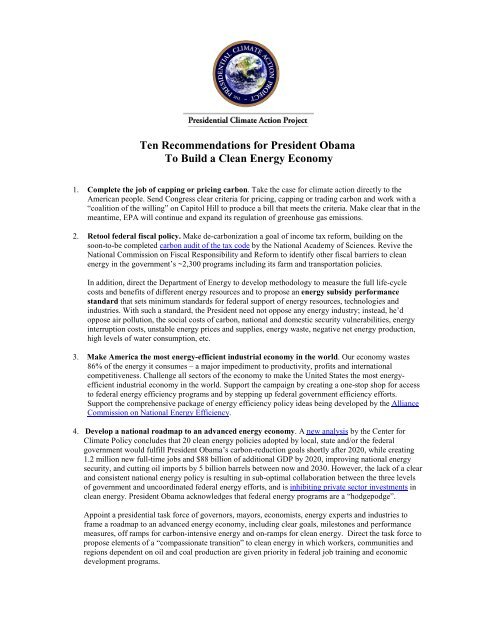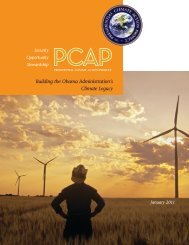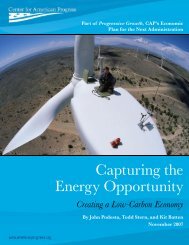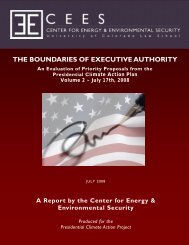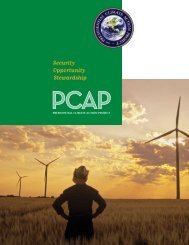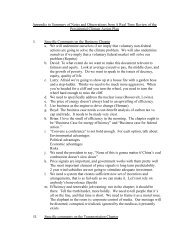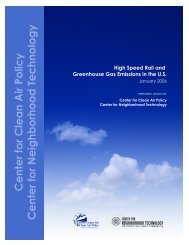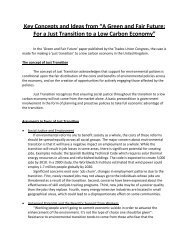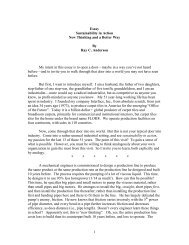PCAP Plan Two Page Summary - Presidential Climate Action Project
PCAP Plan Two Page Summary - Presidential Climate Action Project
PCAP Plan Two Page Summary - Presidential Climate Action Project
Create successful ePaper yourself
Turn your PDF publications into a flip-book with our unique Google optimized e-Paper software.
Ten Recommendations for President Obama<br />
To Build a Clean Energy Economy<br />
1. Complete the job of capping or pricing carbon. Take the case for climate action directly to the<br />
American people. Send Congress clear criteria for pricing, capping or trading carbon and work with a<br />
“coalition of the willing” on Capitol Hill to produce a bill that meets the criteria. Make clear that in the<br />
meantime, EPA will continue and expand its regulation of greenhouse gas emissions.<br />
2. Retool federal fiscal policy. Make de-carbonization a goal of income tax reform, building on the<br />
soon-to-be completed carbon audit of the tax code by the National Academy of Sciences. Revive the<br />
National Commission on Fiscal Responsibility and Reform to identify other fiscal barriers to clean<br />
energy in the government’s ~2,300 programs including its farm and transportation policies.<br />
In addition, direct the Department of Energy to develop methodology to measure the full life-cycle<br />
costs and benefits of different energy resources and to propose an energy subsidy performance<br />
standard that sets minimum standards for federal support of energy resources, technologies and<br />
industries. With such a standard, the President need not oppose any energy industry; instead, he’d<br />
oppose air pollution, the social costs of carbon, national and domestic security vulnerabilities, energy<br />
interruption costs, unstable energy prices and supplies, energy waste, negative net energy production,<br />
high levels of water consumption, etc.<br />
3. Make America the most energy-efficient industrial economy in the world. Our economy wastes<br />
86% of the energy it consumes – a major impediment to productivity, profits and international<br />
competitiveness. Challenge all sectors of the economy to make the United States the most energyefficient<br />
industrial economy in the world. Support the campaign by creating a one-stop shop for access<br />
to federal energy efficiency programs and by stepping up federal government efficiency efforts.<br />
Support the comprehensive package of energy efficiency policy ideas being developed by the Alliance<br />
Commission on National Energy Efficiency.<br />
4. Develop a national roadmap to an advanced energy economy. A new analysis by the Center for<br />
<strong>Climate</strong> Policy concludes that 20 clean energy policies adopted by local, state and/or the federal<br />
government would fulfill President Obama’s carbon-reduction goals shortly after 2020, while creating<br />
1.2 million new full-time jobs and $88 billion of additional GDP by 2020, improving national energy<br />
security, and cutting oil imports by 5 billion barrels between now and 2030. However, the lack of a clear<br />
and consistent national energy policy is resulting in sub-optimal collaboration between the three levels<br />
of government and uncoordinated federal energy efforts, and is inhibiting private sector investments in<br />
clean energy. President Obama acknowledges that federal energy programs are a “hodgepodge”.<br />
Appoint a presidential task force of governors, mayors, economists, energy experts and industries to<br />
frame a roadmap to an advanced energy economy, including clear goals, milestones and performance<br />
measures, off ramps for carbon-intensive energy and on-ramps for clean energy. Direct the task force to<br />
propose elements of a “compassionate transition” to clean energy in which workers, communities and<br />
regions dependent on oil and coal production are given priority in federal job training and economic<br />
development programs.
5. Make sustainable development a national security imperative. Ensure that sustainable development<br />
has a central role in national security strategy. Adamantly defend the Department of Defense goal to<br />
obtain 25% of its energy from renewable resources by 2025 and direct DoD to work with the military<br />
leaders of our allies to adopt similar goals. Direct the Department of Energy to assess how large the<br />
military market for renewables would have to be to achieve economies of manufacturing scale that<br />
lower prices for everyone. Make clear to the American people that every household and community has<br />
a role in national security by reducing its use of fossil fuels, becoming more resilient, and helping<br />
mitigate and adapt to global climate change.<br />
6. Increase America’s mobility options. Inform Congress that to ensure the President’s support, the 2014<br />
transportation reauthorization bill must be designed to reduce America’s use of petroleum and increase<br />
mobility options for the American people, including elderly, young, disabled, minority and low-income<br />
people who cannot operate or afford automobiles.<br />
7. Empower state and local leadership. Champion ample funding and authorities, and reduce<br />
unnecessary barriers in federal programs, to help states and communities establish, sustain and expand<br />
their clean energy and climate programs. For example, plan to use savings from repealed oil and coal<br />
subsidies for a revenue-neutral increase in funding for the State Energy Program.<br />
8. Intensify carbon diplomacy. Negotiate additional bilateral and multi-lateral agreements on clean<br />
energy technologies. Make the U.S. a leader in carrying out the Durban Platform, in part by informing<br />
other nations that the United States is now on the path to achieve nearly 70% of President Obama’s goal<br />
for reducing carbon emissions by 2020. In concert with Canada, Mexico and other supporting nations,<br />
continue pushing for rapid reduction of HFCs domestically under the Clean Air Act and internationally<br />
under the Montreal Protocol.<br />
9. Develop Genuine Progress Indicators. Adopt metrics on public health, education, food security,<br />
housing availability, civic engagement and other quality-of-life factors not measured by GDP. Report<br />
America’s progress every two years in the State of the Union address.<br />
10. Fully Utilize the Bully Pulpit. Public opinion polls show consistently that voters support energy<br />
efficiency and renewable energy, preferring them to fossil fuels. Polls this year also show that clear<br />
majorities now accept the reality of climate change and the need for Washington to act. Build on this<br />
foundation by communicating directly and often with the American people to create a mandate for the<br />
Administration and the Congress to confront climate change and expedite our transition to clean energy.<br />
Use social media and state-of-the-art visual communications to help people share their ideas and better<br />
understand what a clean energy economy will mean to their communities and lives.<br />
Resources:<br />
• <strong>PCAP</strong>’s action plans for 2008, 2010, 2011 and 2012<br />
• 2012 National Advisory Committee<br />
• Wingspread Principles on the U.S. Response to Global Warming:<br />
• Legal analyses of President’s executive powers: February 2008 and July 2008.<br />
About <strong>PCAP</strong>: The <strong>Presidential</strong> <strong>Climate</strong> <strong>Action</strong> <strong>Project</strong> is a private-sector initiative that has convened some<br />
of America’s most important thought leaders to develop clean energy and climate action ideas the<br />
President of the United States could implement under his existing authorities, without further action by
Congress. Foundations and individuals fund <strong>PCAP</strong>. It has produced five reports since its inception in 2007.<br />
For more information, see the project’s web site at www.cllimateactionproject.com or contact Executive<br />
Director William Becker at beckerncs@gmail.com.


